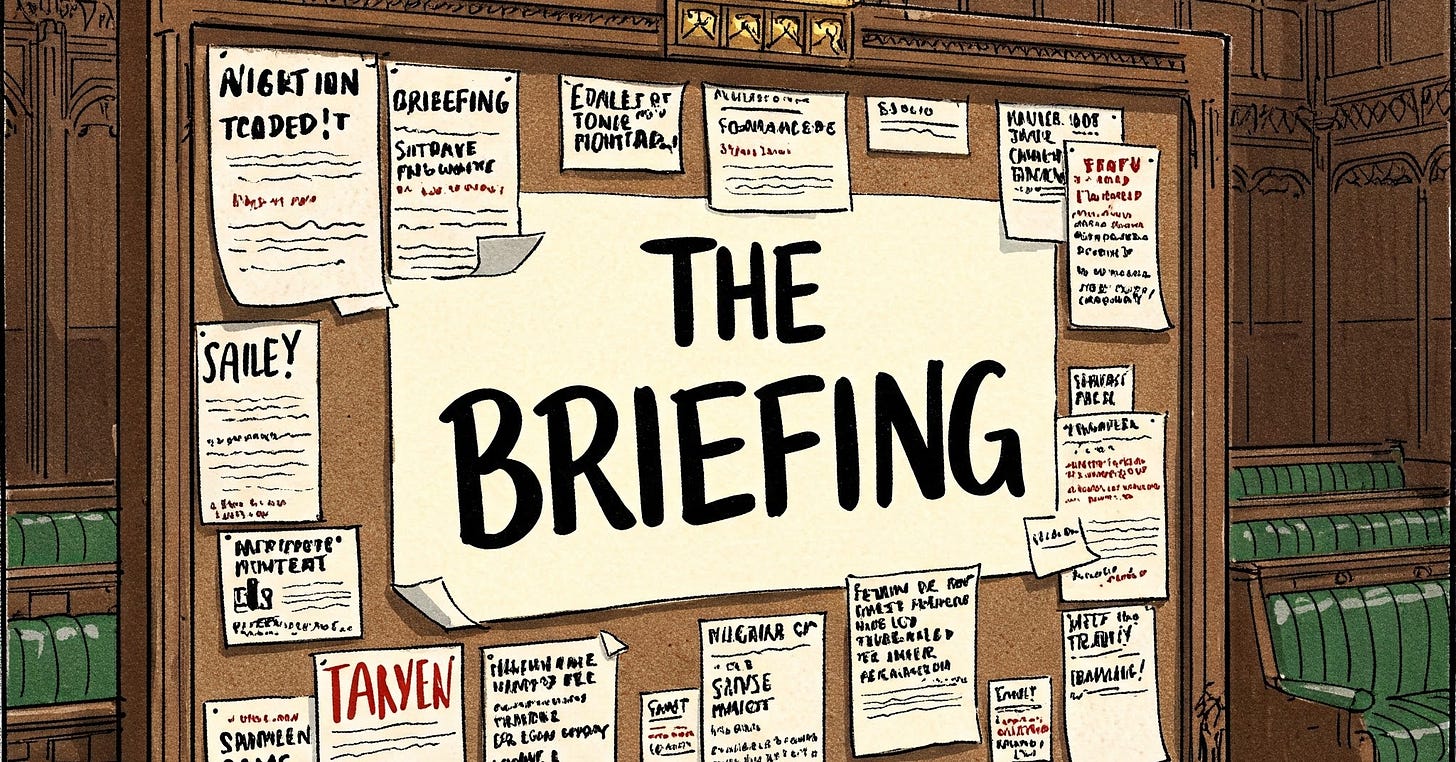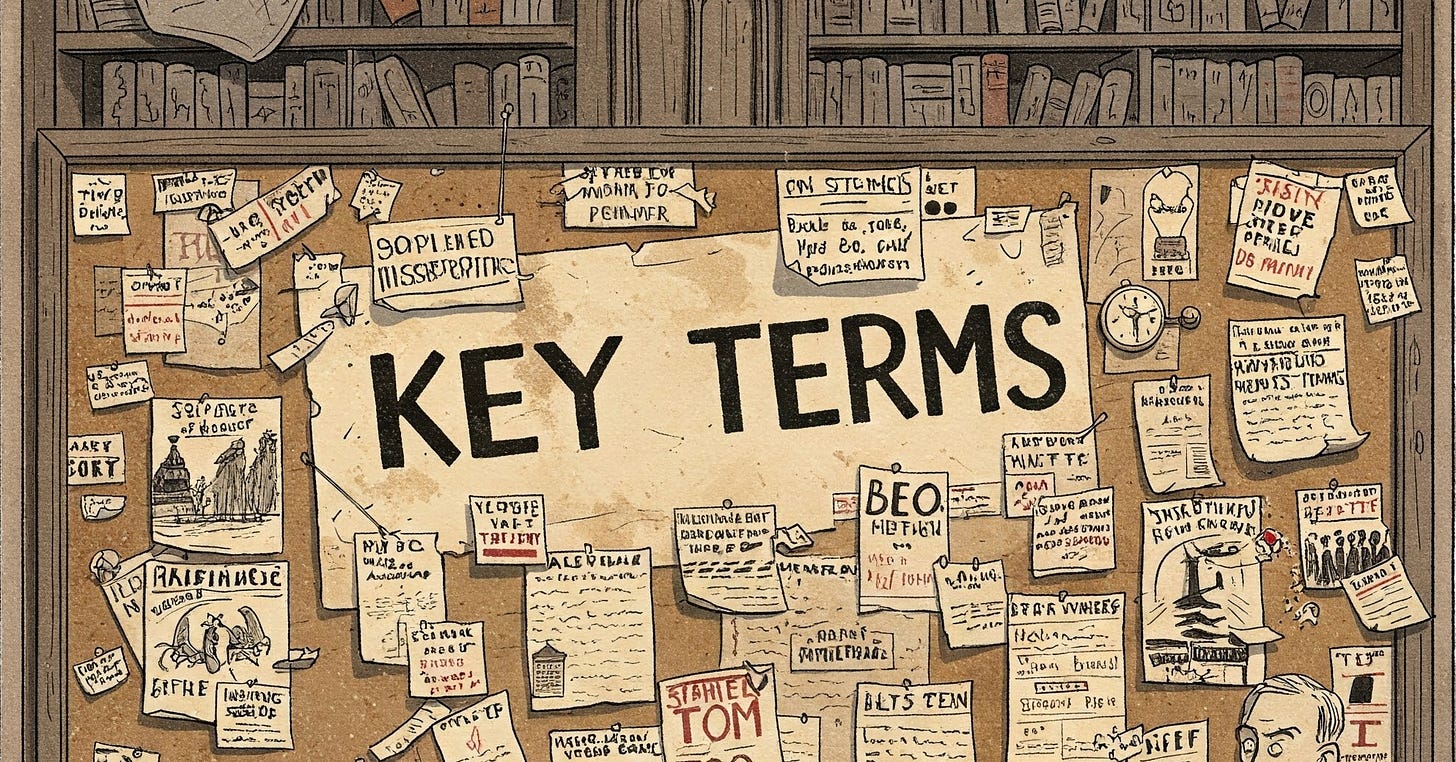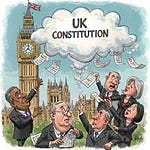Hello again Benchwarmers!,
Have you ever wondered how the different parts of the UK manage their own affairs? It's not all run from London! Understanding devolution – the way power is shared between the UK government and the governments in Scotland, Wales, and Northern Ireland – is key to grasping how the UK really works. It affects everything from healthcare to education in these nations, so it's pretty important stuff for anyone interested in the UK today.
This is the third in our series on the UK Constitution. We hope this is particularly useful for any A-Level politics students studying for their imminent exams this month!
Sharpen your political punditry skills by never missing extended shownotes from The Bench Report. You'll be a guest on ‘Newsnight’ in no time.
Decoding Devolution: The Power Dynamics Across the UK
The UK is a complex place when it comes to who makes the rules. The term "devolved governments" refers to the Scottish Government, Welsh Government, and Northern Ireland Executive, and they each have a specific relationship with the main UK government. The UK government has dedicated "territorial offices" – the Scotland Office, Wales Office, and Northern Ireland Office – to manage these relationships.
The very foundation of these devolved powers lies in three key "devolution statutes" passed by the King in Parliament: the Northern Ireland Act 1998, the Government of Wales Act 2006 (as amended), and the Scotland Act 1998 (as amended). While these laws are fundamental, it's important to know they don't have a special legal status above other Acts of Parliament. The devolved law-making bodies – the Scottish Parliament, the Senedd, and the Northern Ireland Assembly – are created by these statutes and can only act within the boundaries set by them. Interestingly, while the UK Parliament could technically abolish these institutions, doing so would require a referendum in Scotland and Wales, and a treaty amendment for Northern Ireland, highlighting their "permanent part of the United Kingdom’s constitutional arrangements".
A crucial aspect of devolution is the division of responsibilities into "reserved and transferred (or devolved) matters". The UK Parliament keeps control over reserved matters, while the devolved governments handle transferred matters. The specifics of what's reserved are listed in schedules to the Scotland Act 1998 and the Government of Wales Act 2006 . Northern Ireland has "excepted matters" (similar to reserved) and "reserved matters" (which could be transferred later). Even though a matter might be devolved, the UK Parliament can still legislate on it, especially on reserved or excepted issues . However, the "Sewel Convention" dictates that the UK Parliament "does not normally" pass laws on devolved matters without the consent of the relevant devolved legislature, usually expressed through a "Legislative Consent Motion (LCM)" . While this convention is "recognised" in law, it's not legally enforceable .
Each devolved body has its own way of making laws, with its own "legislative process". For example, the Northern Ireland Assembly has a detailed six-stage process. The Scottish Parliament's committees can even propose their own bills on devolved issues and call for evidence . The Senedd's ability to make laws has grown over time , and its bills are formally approved by the King after being submitted by the Presiding Officer . Laws passed by these devolved legislatures can be challenged in court if they stray into reserved areas or violate human rights under the Human Rights Act 1998. The UK's highest court, the Supreme Court, can rule on these "devolution issues".
Don’t forget to head to the podcast website to listen to this episode on the platform of your choice. Follow to receive new episodes as soon as they are released.
The heads of the "devolved governments/executives" are the First Minister (and a deputy First Minister in Northern Ireland, who act together) . Northern Ireland operates under "mandatory coalition government" or "compulsory power-sharing" . In Wales, the First Minister appoints Welsh Ministers, who are approved by the King but aren't considered Ministers of the Crown . The Scottish Government, previously known as the "Scottish Executive" , holds its ministers to high standards of conduct . Interestingly, while the King isn't involved in appointing Northern Ireland ministers, his powers relating to devolved matters can be used by ministers or jointly by the First Minister and deputy First Minister in certain areas .
Financially, the UK government provides a "block grant" to each devolved administration, largely calculated using the "Barnett formula," which isn't actually written into law . These administrations then have significant freedom to decide how to spend this money on devolved matters . There are also ways to resolve financial disagreements through bodies like Joint Exchequer Committees .
The way the UK government and the devolved administrations work together, known as "intergovernmental relations (IGR)," is based on "agreement by consensus" and isn't legally defined . The current framework, established in 2022, includes a top-level council called "The Council" (Prime Minister and Heads of Devolved Governments) and a newer "Council of the Nations and Regions" . These relationships are also supported by a Memorandum of Understanding and specific agreements (bilateral concordats) between UK government departments and the devolved administrations . The Minister for Intergovernmental Relations, currently the Chancellor of the Duchy of Lancaster, plays a key role in managing devolution matters outside of England .
The "Secretaries of State" for Northern Ireland, Scotland, and Wales are important figures, acting as a bridge between the UK government and the devolved administrations and holding onto certain legal powers . For instance, the Secretary of State for Northern Ireland is involved in approving the transfer of some powers and submitting Northern Ireland Assembly laws for Royal Assent . The UK Parliament also has committees like the Northern Ireland Affairs Committee and the Scottish Affairs Committee that scrutinise the work of these territorial offices.
There's also an informal rule where the UK Parliament generally doesn't allow questions on topics that have been devolved , although there are exceptions . It's vital to remember that the United Kingdom Parliament ultimately "retains authority to legislate on any issue, whether devolved or not" .
Glossary of Key Terms
Devolved Governments: The Scottish Government, Welsh Government, and Northern Ireland Executive.
Devolution Statutes: The Northern Ireland Act 1998, the Government of Wales Act 2006 (as amended), and the Scotland Act 1998 (as amended), which form the legal basis for devolution.
Reserved Matters: Areas for which the UK Parliament retains legislative responsibility.
Transferred (or Devolved) Matters: Areas for which the devolved legislatures have legislative responsibility.
Sewel Convention: A convention stating that the UK Parliament will not normally legislate on devolved matters without the consent of the relevant devolved legislature .
Legislative Consent Motion (LCM): The formal way a devolved legislature gives its consent for the UK Parliament to legislate on a devolved matter .
Block Grant: The funding provided by the UK government to the devolved administrations .
Barnett Formula: The non-statutory mechanism used to largely determine the size of the block grant .
Intergovernmental Relations (IGR): The relationships and processes through which the UK government and the devolved administrations interact .
Parliamentary Sources
The United Kingdom constitution
Research Briefing
Published 23 April, 2025
Questions and Answers
What are the main pieces of legislation that established devolution? The key "devolution statutes" are the Northern Ireland Act 1998, the Government of Wales Act 2006 (as amended), and the Scotland Act 1998 (as amended).
What is the difference between reserved and transferred matters? "Reserved matters" are the areas where the UK Parliament still makes laws, while "transferred matters" are the areas where the devolved parliaments have law-making power.
Is the UK Parliament completely restricted from legislating on devolved matters? No, the UK Parliament "retains authority to legislate on any issue, whether devolved or not" . However, the "Sewel Convention" means it would "not normally" do so without the devolved legislature's agreement .
How are the devolved governments funded? They primarily receive a "block grant" from the UK government, largely determined by the "Barnett formula" .
How do the UK government and devolved governments work together? Through "intergovernmental relations (IGR)" which "work on the basis of agreement by consensus" .
Politics is everyone’s business. Know someone who will benefit from knowing more about this issue? Please share The Bench Report with them.
What you can do.
If you live in Scotland, Wales, or Northern Ireland, try to identify which government (UK or devolved) is responsible for services that directly affect you, like healthcare or education. This will give you a practical understanding of devolution in action.
Keep an eye on news about discussions or disagreements between the UK government and the devolved administrations. These often highlight the complexities and evolving nature of the devolution settlement.
Consider looking at the websites of the Scottish Parliament, Senedd, or Northern Ireland Assembly to see the kind of debates and legislation they are currently working on. This can give you a firsthand look at devolved policy-making.
Join the campaign!
Find us on socials: X / Bluesky / Facebook / Instagram
Shape our next episode! Get in touch with an issue important to you - I’ll grab another coffee and start the research.
Email: thebenchreportuk@gmail.com
Subscribe for free to stay connected, never miss extended shownotes and astound your friends at dinner parties.

















Share this post